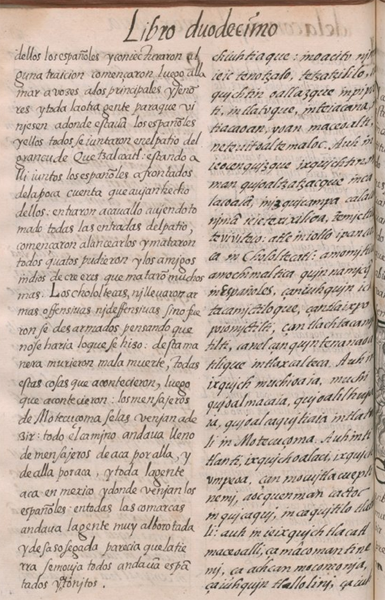Folio 16 verso
Translations and Transcriptions
Spanish Translation
[Translation of the Nahuatl into Spanish by Fr. Bernardino de Sahagún; transcription of the Spanish (left-hand column) by James Lockhart:] [f. 16v.] dellos los españoles y coniecturaron alguna traicion començaron luego a llamar a vozes a los principales y señores y toda la otra gente para que viniesen a donde estauā los españoles y ellos todos se iuntaron en el patio del gran cu de Quetzalcoatl: estando alli iuntos los españoles afrontados de la poca cuenta que auian hecho dellos: entraron a cauallo auiendo tomado todas las entradas del patio, començaron a lancearlos y mataron todos quatos pudieron y los amigos indios de creer es que matarō muchos mas. Los chololtecas, ni lleuaron armas offensiuas ni deffensiuas sino fueronse desarmados pensando que no se haria lo que se hizo: desta manera murieron mala muerte, todas estas cosas que acontecieron, luego que acontecieron: los mensajeros de Motecuçoma se las venian a dezir: todo el camino andaua lleno de mensajeros de aca por alla, y de alla por aca, y toda la gente aca en mexico y donde venian los españoles en todas las comarcas andaua la gente muy alborotada y desasosegada parecia que la tierra se mouia todos andauā espātados y atonitos.
English Translation
[Translation of the Nahuatl (right-hand column) by James Lockhart:]
When they arrived, there was a general summons and cry that all the noblemen, rulers, subordinate leaders, warriors, and commoners should come, and everyone assembled in the temple courtyard. When they had all come together, [the Spaniards and their friends] blocked the entrances, all the places where one entered. Thereupon people were stabbed, struck, and killed. No such thing was in the minds of the Cholulans; they did not meet the Spaniards with weapons of war. It just seemed that they were stealthily and treacherously killed, because the Tlaxcalans persuaded [the Spaniards] to do it.
And a report of everything that was happening was given and relayed to Moteucçoma. Some of the messengers would be arriving as others were leaving; they just turned around and ran back. There was no time when they weren’t listening, when reports weren’t being given. And all the common people went about in a state of excitement; there were frequent disturbances, as if the earth moved and
Analytic Transcription
[Transcription of the Nahuatl (right-hand column) by James Lockhart:] [f. 16v.] chiuhtiaque: in oacito nimā ie ic tenotzalo, tetzatzililo, ixquichtin oallazque in pipilti, in tlatoque, in teiacana, in tiacaoan, yoan maceoati, neteuitoaltemaloc. Auh in ie ocenquizque ixquichtin, niman quioaltzatzacque in calacoaiā, in izquicampa calacoa, nimā ie ic texixilioa, temictilo, teviviteco, atle iniollo ipan catca in Chololtecatl: amo mitica amo chimaltica quinnamicq¯ in Españoles, çan iuhquin ichtacamictiloque, çan tlaixpopoiomictilti, çan tlachtacamictilti, canel çan quintenanaoatilique in tlaxcalteca. Auh in ixquich muchioaia, muchi quioalmacaia, quioalilhuiaia, quioalcaquitiaia in tlatolli in Motecuçoma. Auh in titlanti, ixquich oalaci, ixquich vmpeoa, çanmocuitlacueptinemi, aoc quenman cactoc in quicaqui, incaquitilo tlatolli: auh in ie ixquich tlacatl maceoalli, çamâcomantinemi, ça achcan mocomonia, ça iuhquin tlallolini, ça iuh
Image

Spanish Translation
[Translation of the Nahuatl into Spanish by Fr. Bernardino de Sahagún; transcription of the Spanish (left-hand column) by James Lockhart:] [f. 16v.] dellos los españoles y coniecturaron alguna traicion començaron luego a llamar a vozes a los principales y señores y toda la otra gente para que viniesen a donde estauā los españoles y ellos todos se iuntaron en el patio del gran cu de Quetzalcoatl: estando alli iuntos los españoles afrontados de la poca cuenta que auian hecho dellos: entraron a cauallo auiendo tomado todas las entradas del patio, començaron a lancearlos y mataron todos quatos pudieron y los amigos indios de creer es que matarō muchos mas. Los chololtecas, ni lleuaron armas offensiuas ni deffensiuas sino fueronse desarmados pensando que no se haria lo que se hizo: desta manera murieron mala muerte, todas estas cosas que acontecieron, luego que acontecieron: los mensajeros de Motecuçoma se las venian a dezir: todo el camino andaua lleno de mensajeros de aca por alla, y de alla por aca, y toda la gente aca en mexico y donde venian los españoles en todas las comarcas andaua la gente muy alborotada y desasosegada parecia que la tierra se mouia todos andauā espātados y atonitos.
English Translation
[Translation of the Nahuatl (right-hand column) by James Lockhart:]
When they arrived, there was a general summons and cry that all the noblemen, rulers, subordinate leaders, warriors, and commoners should come, and everyone assembled in the temple courtyard. When they had all come together, [the Spaniards and their friends] blocked the entrances, all the places where one entered. Thereupon people were stabbed, struck, and killed. No such thing was in the minds of the Cholulans; they did not meet the Spaniards with weapons of war. It just seemed that they were stealthily and treacherously killed, because the Tlaxcalans persuaded [the Spaniards] to do it.
And a report of everything that was happening was given and relayed to Moteucçoma. Some of the messengers would be arriving as others were leaving; they just turned around and ran back. There was no time when they weren’t listening, when reports weren’t being given. And all the common people went about in a state of excitement; there were frequent disturbances, as if the earth moved and
Analytic Transcription
[Transcription of the Nahuatl (right-hand column) by James Lockhart:] [f. 16v.] chiuhtiaque: in oacito nimā ie ic tenotzalo, tetzatzililo, ixquichtin oallazque in pipilti, in tlatoque, in teiacana, in tiacaoan, yoan maceoati, neteuitoaltemaloc. Auh in ie ocenquizque ixquichtin, niman quioaltzatzacque in calacoaiā, in izquicampa calacoa, nimā ie ic texixilioa, temictilo, teviviteco, atle iniollo ipan catca in Chololtecatl: amo mitica amo chimaltica quinnamicq¯ in Españoles, çan iuhquin ichtacamictiloque, çan tlaixpopoiomictilti, çan tlachtacamictilti, canel çan quintenanaoatilique in tlaxcalteca. Auh in ixquich muchioaia, muchi quioalmacaia, quioalilhuiaia, quioalcaquitiaia in tlatolli in Motecuçoma. Auh in titlanti, ixquich oalaci, ixquich vmpeoa, çanmocuitlacueptinemi, aoc quenman cactoc in quicaqui, incaquitilo tlatolli: auh in ie ixquich tlacatl maceoalli, çamâcomantinemi, ça achcan mocomonia, ça iuhquin tlallolini, ça iuh
Image
